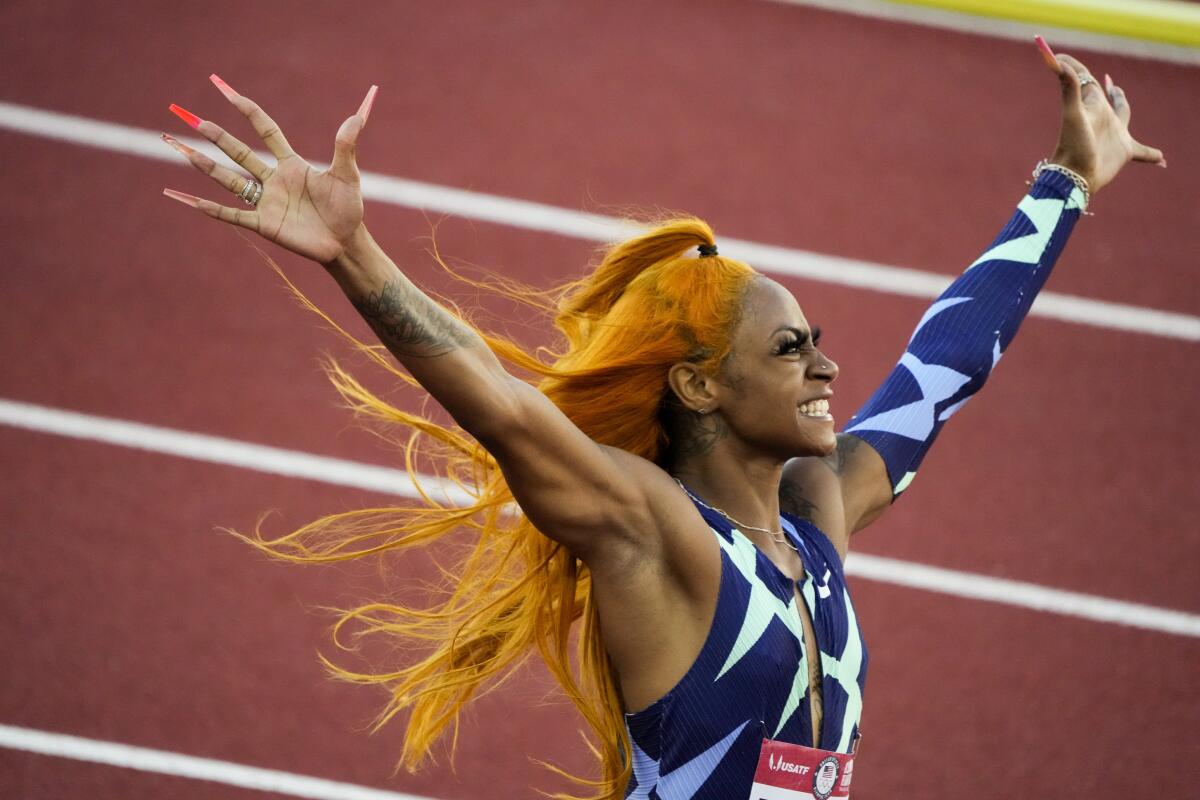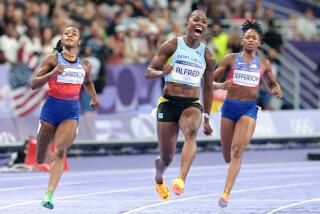Column: The Olympics shouldn’t test for cannabis — much less ban athletes who test positive

- Share via
I must have been too busy in the winter of 1998 to pay attention to the Olympic Winter Games in Nagano, Japan. I missed the story of the first snowboarder to win a gold medal, and the craziness that ensued after a drug test found a vanishingly small amount of THC in his urine.
But Thursday, that snowboarder, Ross Rebagliati of Canada, recounted his strange tale on a podcast called “Great Moments in Weed History,” hosted by cannabis writers David Bienenstock and Abdullah Saeed.
It was a timely interview, since the sprinter Sha’Carri Richardson, one of the fastest women in the world, was suspended in June from the U.S. Olympic track and field team for a month after testing positive for THC. She was subsequently not chosen for the 400-meter relay team, so she will not be competing in the Olympics.
Richardson’s punishment raised for the umpteenth time questions about why cannabis should even be on a list that includes anabolic steroids, stimulants and masking agents like diuretics, which make it harder to detect banned substances. Even a statement from the U.S. Anti-Doping Agency dripped with regret: “While the rules are clear, it is a terrible situation.”
On the podcast, Rebagliati said Richardson’s suspension “made me remember … the weight of the decision coming down on me, feeling shocked, and embarrassed and disgraced, the whole gamut of emotions that I’m sure [she] is feeling as well.”
Fortunately, Richardson seems to be handling the disappointment well.
In an interview with NBC’s “Today” show in early July, she apologized to her fans, family and sponsors. She explained that she’d used cannabis after a reporter told her that her biological mother had died. (Richardson was raised by her grandmother.)
“To hear that information coming from a complete stranger, it was definitely triggering, it was definitely nerve-shocking.” But, she added, she was now going to focus on taking care of herself. “I’m young,” she said. “I’ve got plenty of Games left in me.”
If Richardson had gotten falling-down drunk instead of ingesting weed, she’d probably have competed Saturday in the women’s 100-meter final.
After all, drinking is a celebrated pastime in Olympic villages. This year, in an effort to curb the spread of COVID-19, Tokyo Olympics officials banned alcohol in the village and other venues. Instead, as SKY News reported, “Athletes who might want a drink to celebrate have been told by organizers to ‘drink alone’ in their rooms.”
Drink alone? Yeah, great advice. Alcohol is far more dangerous a substance than cannabis. As cannabis proponents often say, while alcohol kills thousands of Americans directly and indirectly each year, no one has died of a cannabis overdose. (You might get so high you think you are going to die; that is a different issue.)
“I understand that the Olympics have the ability to sanction players based on conduct and for using performance-enhancing drugs, but there’s no evidence that cannabis is performance-enhancing,” marijuana researcher and physician Sue Sisley told the Washington Post. “This seems genuinely unfair that we continue to punish athletes based on a test that should not even be done. Why do the Olympics continue to test for THC at all?”
No kidding.
Rebagliati, who grew up in the weed-friendly British Columbia town of Whistler, said on the podcast he had just assumed pot was a banned substance, and had stopped smoking it nearly a year before the competition. But, he said, he had been around plenty of pot smoke at parties before he left for Japan. He believed secondhand smoke was the culprit.
Still, when his post-race drug test turned up positive, his medal was stripped away. Unbeknownst to him, the Olympic physicians took his urine results to the police, and he ended up spending five hours being interrogated by Japanese police, who considered charging him with importing a controlled substance into Japan. (Via his bladder.)
They opted to let him go, and his medal was returned to him after it became clear that cannabis was not even on the official list of banned substances at that point. Not only that, but the threshold for a positive test in 1998 was only 15 nanograms per milliliter of urine. Rebagliati had 17.8 ng/ml. In 2013, the threshold for a positive test was raised to 150 ng.ml.
The World Anti-Doping Agency, which has published a list of prohibited substances sine 2004, declared a substance would be banned if it met two out of three criteria: It has the potential to enhance, or enhances, sport performance; it represents an actual or potential health risk to the athlete; or it violates the spirit of sport.
Athletes who use cannabis, the U.S. Anti-Doping Agency says, “potentially endanger themselves and others because of increased risk taking, slower reaction times and poor executive function or decision making.”
In 2011, WADA claimed in a journal article that because marijuana can help reduce anxiety, it could help athletes “better perform under pressure and to alleviate stress experienced before and during competition.” It also noted that pot seemed to have a beneficial effect on athletes who “experienced traumatic events in their sports career.”
Six years later, in 2017, the Journal of Science and Medicine in Sport published a review of 15 studies that examined the effect of cannabis on exercise performance. No one, it concluded, showed any improvement in aerobic performance. In some subjects, the ability to complete an exercise protocol was impaired.
So cannabis can help put you in a good state of mind to compete, but it probably has no positive effect on your physical performance.
But here is the rub: We just witnessed the effect that not being in the right mental state can have on athletic performance. With the glare of the world upon them, G.O.A.T. gymnast Simone Biles and tennis great Naomi Osaka both withdrew from competition for reasons that seemed to have nothing to do with their physical conditions and everything to do with their states of mind.
Maybe a little THC could have helped them both.
@AbcarianLAT
More to Read
A cure for the common opinion
Get thought-provoking perspectives with our weekly newsletter.
You may occasionally receive promotional content from the Los Angeles Times.











